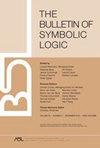The Axiom of Infinity and transformations j: V -> V
IF 1.1
3区 数学
Q1 LOGIC
引用次数: 4
Abstract
We suggest a new approach for addressing the problem of establishing an axiomatic foundation for large cardinals. An axiom asserting the existence of a large cardinal can naturally be viewed as a strong Axiom of Infinity. However, it has not been clear on the basis of our knowledge of ω itself, or of generally agreed upon intuitions about the true nature of the mathematical universe, what the right strengthening of the Axiom of Infinity is—which large cardinals ought to be derivable? It was shown in the 1960s by Lawvere that the existence of an infinite set is equivalent to the existence of a certain kind of structure-preserving transformation from V to itself, not isomorphic to the identity. We use Lawvere's transformation, rather than ω, as a starting point for a reasonably natural sequence of strengthenings and refinements, leading to a proposed strong Axiom of Infinity. A first refinement was discussed in later work by Trnkova–Blass, showing that if the preservation properties of Lawvere's tranformation are strengthened to the point of requiring it to be an exact functor , such a transformation is provably equivalent to the existence of a measurable cardinal. We propose to push the preservation properties as far as possible, short of inconsistency. The resulting transformation V → V is strong enough to account for virtually all large cardinals, but is at the same time a natural generalization of an assertion about transformations V → V known to be equivalent to the Axiom of Infinity.无穷公理与变换j: V -> V
我们提出了一种新的方法来解决为大基数建立公理基础的问题。一个断言一个大基数存在的公理自然可以被看作是一个强大的无限公理。然而,基于我们对ω本身的认识,或者基于我们对数学宇宙真实本质的普遍认同的直觉,我们还不清楚无限公理的正确强化是什么——哪些大基数应该是可衍生的?Lawvere在20世纪60年代证明了无限集的存在性等价于V到自身的某种保结构变换的存在性,与恒等不同构。我们使用Lawvere的变换,而不是ω,作为一个合理自然的增强和改进序列的起点,从而得出一个强大的无限公理。Trnkova-Blass在后来的工作中讨论了第一个改进,表明如果Lawvere变换的保存性质被加强到要求它是一个精确函子的地步,这样的变换可证明等同于可测量的基的存在性。我们建议尽可能地推动保存属性,避免不一致。由此得到的变换V→V的强度足以解释几乎所有的大基数,但同时也是一个关于变换V→V的断言的自然推广,该断言等价于无穷公理。
本文章由计算机程序翻译,如有差异,请以英文原文为准。
求助全文
约1分钟内获得全文
求助全文
来源期刊
CiteScore
0.60
自引率
0.00%
发文量
32
审稿时长
>12 weeks
期刊介绍:
The Bulletin of Symbolic Logic was established in 1995 by the Association for Symbolic Logic to provide a journal of high standards that would be both accessible and of interest to as wide an audience as possible. It is designed to cover all areas within the purview of the ASL: mathematical logic and its applications, philosophical and non-classical logic and its applications, history and philosophy of logic, and philosophy and methodology of mathematics.

 求助内容:
求助内容: 应助结果提醒方式:
应助结果提醒方式:


